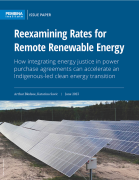Renewable is Doable is a joint study by WWF-Canada and the Pembina Institute to identify electricity scenarios for Ontario that would meet future power demands without the use of nuclear power and coal, and that would generate lower greenhouse gas emissions than the plan currently proposed by the Ontario Power Authority.
The study consists of two background reports:
Report No. 1: Analysis of Resource Potential and Scenario Assumptions, written by the Pembina Institute, presents a review of the technical and practical potential and cost of electricity supply and conservation measures for the province of Ontario. It includes an analysis and review of renewable energy sources, and the potential impact of conservation and demand management measures.
Report No. 2: Analysis and Scenario Modelling of the Ontario Power System, written by Marc Godin of Portfire Associates for WWF-Canada uses the information from the first report to model three electricity futures for Ontario — two green scenarios and the Ontario Power Authority's preliminary plan — using a computer model developed by the World Alliance for Decentralized Energy (WADE). The model uses data from the Ontario Power Authority and cross-references it with comparable energy efficiency and renewable energy project performance in the U.S. and Europe.
Renewable is Doable concludes that smart, targeted investments in a diverse array of energy efficiency and renewable energy solutions over the next 20 years will achieve major cuts in greenhouse gas emissions, accelerate the closure of our highly-polluting coal plants and avoid the need for new nuclear investments. The study finds also that over 20 years, the delivered costs of a green electricity plan for Ontario are less than that for the OPA preliminary plan.







